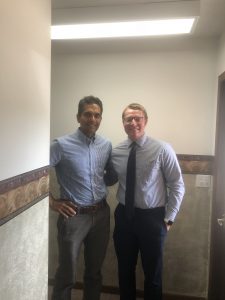Eric Lakomek ’21– This summer I have had the pleasure to participate in an Immersive Learning experience funded by the Wabash Global Health Initiative with alumnus Dr. Sean Sharma ’98 and the staff at the Fountain and Warren County health departments. I was given the opportunity to experience the outreach of public health in the only bi-county health department in the state of Indiana.

The principal task I spent most of my time on this summer was developing an open-ended project that addressed a major health care need in the community that would have a lasting impact on the residents for years to come. After searching through many recent demographics of the area, I decided to develop a project to combat the mental health crisis facing both Fountain and Warren counties.
Nearly one in five people in both counties are affected by depression and anxiety. In Fountain County, 15 methamphetamine labs were seized in 2013, and both counties have an extremely high drug overdose rate. However, the ratio of mental health and addiction care providers in Fountain County was 2,082:1. These statistics helped demonstrate a serious problem that desperately needed to be addressed in this extremely underserved area.
For the little help residents do receive, the rapid ascent of mental health illness and substance abuse diagnoses is not coupled with an accelerated awareness of resources available to the community. In addition, the stigma surrounding mental health must be reduced so that those who need help are more willing to seek it.
I created a series of posts and articles detailing the many different disorders, common symptoms, and where to seek treatment, as well as a list of around 50 immediate and professional resources within 50 miles of the health department. I also called different locations of treatment facilities and attempted to find out the average wait times and what to expect to make things more transparent. This made me realize the difficulties an individual goes through just to get in the door of these treatment facilities.
Often times, individuals can not receive the proper treatment they need because of the lack of access to care and governmental funding. What I observed this summer has allowed me to put my liberal arts education to use and apply it to addressing the behavioral needs of the community. Mental health is not a clear-cut subject. Each person has a different story and viewing it from different perspectives has allowed me to understand a completely diverse side of this growing topic.
I am excited to use what I have learned and look forward to using it to make the mental health process easier to navigate in the future. There is a growing crisis in America today, but as I have learned, there still a reason to keep on fighting the stigma. Many groups today are working on moving mental health to the forefront of healthcare problems that must be addressed. Thank you to all who have made this internship possible!